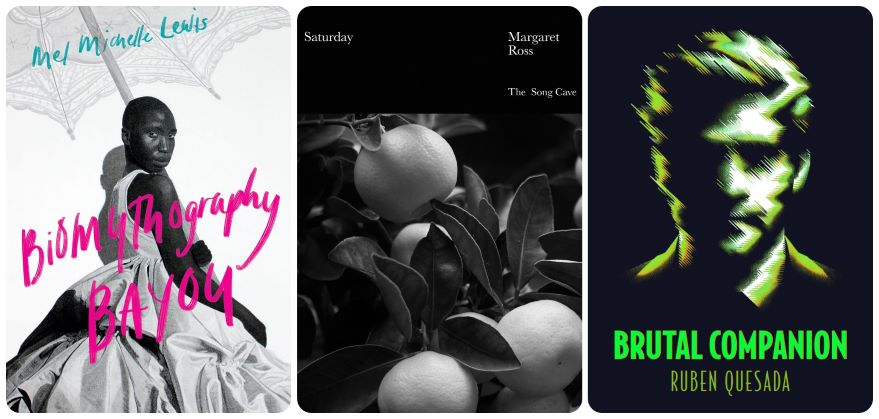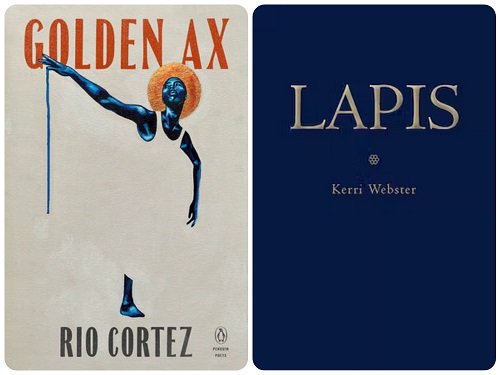New collections to make life more lyrical.

A lot of us are feeling heartsick right now, so I’ve been on the lookout for poetry that energizes, moves, and welcomes me in, something I can’t wait to share with you. And I think I’ve got it: Biomythography Bayou (Bucknell University Press) by Mel Michelle Lewis, a bountiful feast of a book. The word “biomythography” was coined by the Black, lesbian, feminist poet Audre Lorde to describe a blending of biography, folklore, and cultural history for more intricate personal narratives.
The first thing you notice about Biomythography Bayou is its fecundity, its rich and generous voice. Yet not a word is wasted. Right from the start, you feel the presence of ancestors, their interwoven histories, and the effulgence of Lewis as a Black, queer woman with a complex heritage.
“I am writing from my soul,” Lewis says in the opening pages. And you feel that soulfulness strongly, even though it’s clear that a lot of research and thoughtfulness went into making this book. The narrative unfolds so that anyone (and I write as a white, heterosexual woman) feels welcome here. There’s nothing exclusionary about it.
The book is divided into five parts: Water, Fire, Earth, Mineral, and Nature, with invocations for the reader in each section.
But as its title implies, this isn’t an ordinary collection. Yes, it contains poetry, including several long narrative pieces. But there’s also essay, memoir, photography, and several poem/recipes. “Red Clay Recipe” begins:
“Chile, git dat thumb out cho’ mouth!”
Asberry suck his thumb.Prep time: done snuck off — till “Asberry, git your behind in heah and set this dinner table!”
Servings: As much as you want, YOU made it!
Lewis writes, “As the griot, I can’t run from the nature of the sound of the stories and poems and praise songs and spells and recipes meant to be read and spoken and heard — voiced — in my work. Among these are also the elements of truth. How do I share the nature of my own situatedness?”
Lewis achieves this in various ways: Sometimes with dialect, sometimes in consulting the ancestors, sometimes by drawing inspiration from the likes of Lorde, Zora Neale Hurston, Langston Hughes, and Lorraine Hansberry. I also hear the kind of explosive exuberance you get from Etheridge Knight, with short lines and repeated refrains that read like incantations or call-and-response. But the voice is Lewis’ own.
There’s also a bit of religious reference. “Tongues of Fire” is a 12-page poem about a little girl’s growing awareness of her queerness and what it means about her place in the Catholic Church. There’s such immediacy in the writing.
In the Nature section, which fittingly comes at the end of the book, Lewis shares this “Invocation for the Reader”:
May you have
Black joy
Laugh
Let
May you have
Meaningful memory
Mourn
Make
May you have
Queer longings
Lust
Love
May you have
Sonic essentials
Hear
Me
Out
May you have
Culinary yearnings
Boil
Down
May you have
Nature
Bayou fete
That about says it all for this effusive celebration of a book recommended to readers of all stripes, ages, and walks of life.
*****
Margaret Ross will intrigue you in quite another way. When she reads her poetry (you can find some readings on YouTube), she recites it from memory with an almost dissociative clarity. The delivery serves her work well, with its themes of borrowed emotion and pretense, played out in lieu of authentic exchanges. Her poems tend to run two or three pages, usually broken into short stanzas, with a heavy use of enjambment and minimal punctuation. Saturday (the Song Cave) is her second collection.
Seemingly disjointed childhood impressions sometimes crop up in the poems, but nothing is what it pretends to be. “Greenish Picture” begins with the lines, “There were too many doors; there were/two right in the middle of a hallway.” As the poem progresses, Ross observes:
I liked when guests came and my parents
rose up to the surface of themselves.
My mother put on makeup
and my father smiled, turning lights on.
Later in the poem, after the guests have left:
I heard
my parents, washing up, discuss them.
Someone was sick. Someone with too much
money was always doing something
meaningless. A childless woman
remained a child: arrogant, eccentric.
The poem ends with a green shelf of mismatched toys: “The elephant. The seashell with a face/The other fawn with holes in its skull/from when it was a salt shaker.”
She also works in the gig economy. In “Evolution,” at a natural-history store, she’s tweezing apart butterfly wings to use as decoration; in “Songs of Innocence and Experience,” she’s teaching Writing as an Ethical Act:
Everybody in the basement knows
the Ethical Act is writing
I assign to read. Student writing is
constructing arguments from excerpts
of a story or a poem we call supporting
evidence, proof
And later:
Don’t teach anything you love too much
is advice I was given
In another poem, a woman taps watermelon rinds to see which fruits are ripe. The hollower the sound, the sweeter the melon.
Sexual relationships are performative, lacking genuine connection. People look away from each other’s pain. Survival depends on the barriers put up between yourself and others. “Inner Wall” ends with this chilling stanza:
Detach yourself from the suffering on which
your comfort depends. But I want
to remember where I learned to do that
Margaret Ross will stop you in your tracks. And something tells me she’s just getting started.
*****
The opening lines of Ruben Quesada’s Brutal Companion (Barrow Street) are quite startling: “My mother is going to die. Her ashes/will be sewn into the ocean/stitched/onto passing angelfish.” The poem is entitled “Terminology” — as in, calling something by name. But here, the word terminal is also alluded to.
You notice the ashes will be sewn rather than thrown, stitched rather than ditched, and then we get the smooth continuation of his mother’s ashes into another dimension with “passing angelfish.” Further into the poem, he addresses a lover, anticipating his loss in years to come: “and I will know/then, Aristophanes was right/about two halves of man faring/through life in search of each other.”
Impending loss, then, is the brutal companion. Or more specifically, the fleeting nature of our connection to others. In the Greek myth referred to here, humans used to be two-headed, with four arms and four legs. Zeus separated them — male/male, female/female, and male/female into two parts to prevent their being too powerful. And so, we are companioned not by our soulmates but by loss.
Then, as we move through the poems, the brutal companion becomes addiction, too, and the pills that keep the pain of loss at bay:
Today, while you were at work, I learned
Another way to leave you. I did laundry,
Took a Xanax, and folded a syringe
And a tourniquet into a drawer.
Quesada writes as a gay man about self-acceptance, desire, and longing. Listen to these lines from “A Paean”:
Take me. Take this.
My wasted life
and all
its bliss — the sea
of your body
with its warm grip on night’s
wrist. Your lips
curled into me.
Your eyes
set me loose
in a foggy
lake. Looks
call to fill my
deadened heart.
I enjoy the musicality of his language, the alliteration and internal rhyme, but also the pacing and variety. His poems take different shapes as they move down the page. And as they move us in different ways, there’s room to breathe between stanzas.
He returns to the metaphor of sewing in one of my favorites from the collection, “Genesis,” an ars poetica. Here are a few lines:
We’ll begin by weaving a heroic couplet with the tip
Of our tongues then spit and spin fringe for flare. Thread
A loose sentence. Darn it. The slip stitch of subject
And predicate through ribbed velveteen.
The penultimate prose poem, “My Mother Is a Garden,” is a portrait of his mother. And he closes the book as he began, with her impending loss, in “The Fortune Teller,” with this final stanza:
She turned
away, wiping
her mouth
and said
last night
as your mother
died,
a haze
of zinnias
hushed
in the rain
So, perhaps the brutal companion becomes a kind of salvation. Living with the knowledge that loss is inevitable keeps the heart open to tenderness, beauty, and love wherever it is found. Something to consider as we go into the next four years.
Amanda Holmes Duffy is a columnist and poetry editor for the Independent and the voice of “Read Me a Poem,” a podcast of the American Scholar.

